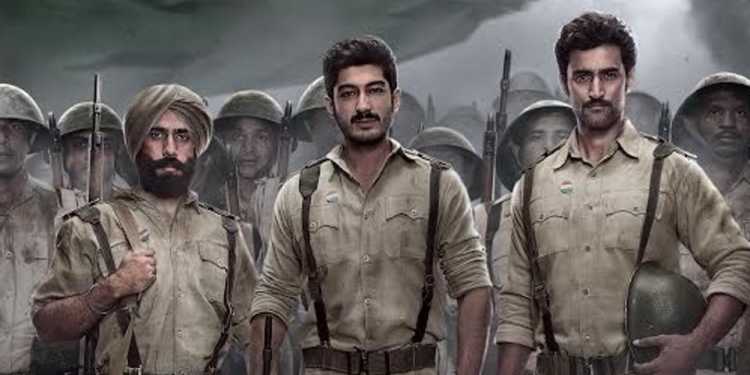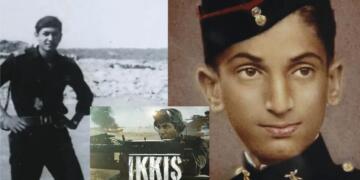Before I begin with the detailed review of the movie, here is the short one: Go and watch it now. There has rarely been a movie so well crafted as this in Bollywood. It’s an epic. A must watch for every Indian who have forgotten the real heroes of the Freedom Struggle.
Raag Desh is the retelling of the origins of Indian National Army, or Azad Hind Fauj as it was called in Hindi, which shook the British Raj in Burma during the later stages of World War II. The story is shown through flashbacks that occur during the trials of three INA officers. The underhyped movie is a gritty thought provoking piece of art which is so exhilarating that you might want to visit the theater more than once.
Raag Desh has been released with Indu Sarkar, a movie which has garnered a lot of attention due to its setting during the Emergency. With other bigger ‘entertaining’ films in theaters like Munna Michael and Jagga Jasoos, a film produced by Rajya Sabha TV has made its place although with less number of shows. People are drawing similarities and intentions between the release of both Indu Sarkar and Raag Desh. Hauntingly, one of the reviews that I read about this movie before buying tickets, questioned the movie’s motives, as this movie instills people nationalism and a sense of pride, which is apparently, nothing short of blasphemy.
The movie, unlike Indu Sarkar does not provide a disclaimer of fiction at the beginning, but rather, it tells us that all the characters and events shown in the film are real. During the end credits the film goes on to show the real faces of the characters in comparison with the actors. Unlike Madhur Bhandarkar, Tigmanshu Dhulia does not handle real history with gloves. Unlike Indu Sarkar which focused on a fictional character and refuses to take true names of the characters, Raag Desh celebrates the true heroes of our Independence.
Plot:
Raag Desh starts off with the explanation of the political scenario of the world during World War II. The story then jumps to the surrender of the three soldiers Kunal Kapoor as Shah Nawaz Khan, Amit Sadh as Gurbaksh Singh Dhillon and Mohit Marwah as Prem Sahgal, whose father, played very well by Kanwaljit Singh, goes on to request Bhulabhai Desai to fight this trial. Through flashbacks we are made to realize how brutally the British Indian Army was defeated during the Second World War at the hands of the Japanese in Southeast Asia. After their surrender they are given the title of Indian National Army, but only after the introduction of Netaji Subhash Chandra Bose, played extraordinarily well by Kenny Basumatary, the INA got its true objective. Eventually, the war waged by INA is lost, the soldiers are captured and put into different jails of the country. In some jails these soldiers are even massacred, such as the one in Bangladesh. The charges these three soldiers faced amounted to hanging as punishment. Would they be hanged?
Raag Desh has plenty of action scenes that look pretty decent despite the low budget of only 10 crore rupees. The locations look convincing and extraordinarily beautiful. Even the Red Fort is shown in all its glory. But the movie, at its heart is a courtroom drama that will keep the viewers on the edge of their seats. The soundtrack is good. The song Kadam Kadam Badhaye Jaa will instantly give you goosebumps and is very well done. The acting of all actors is good, but does look over the top in some scenes. The non linear storyline gives it a Nolan-y feel. One thing I felt lacking was the haunting idea of killing your own brothers as there were Indians in both the British Indian Army and Azad Hind Fauj. This idea should have been developed more than a casual reference.
[This paragraph is spoiler, the history itself is. If you don’t wish to read it, you should skip this paragraph.]All three of them are found guilty of the aforementioned crimes, however, they’re not sentenced for it. We must remember that they weren’t sentenced out of fear of the already angered Indians. Had they been sentenced, the British Indian Army would have mutinied against the British. The British were able to rule because of the army, if they weren’t able to trust their own army, how would they rule. They knew their days in the continent were limited and all that they could was was extend their stay as long as possible to make sure that India stays divided after they leave.
Tigmanshu Dhulia has done a marvelous job of recreating a part of true history and I have nothing but praise for him. With Gandhi and Nehru occupying the entirety books and movies as the most ardent of freedom fighters who sacrificed the most, it is quite refreshing to see real men who gave up life to fight for the liberty of all Indians. Netaji S. C. Bose has always been overlooked in history books because he was a staunch critic of Gandhi, who did not let him function as the Congress president. The history is written by victors and Nehru won, Netaji lost. Gandhi was given multiple chapters, Netaji and his Azad Hind Fauj just a paragraph.



























